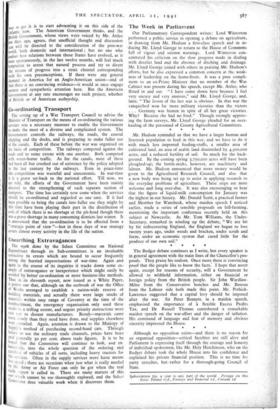Co-ordinating Transport
The setting up of a War Transport Council to advise the Minister of Transport on the means of co-ordinating the various services was a necessary measure to enable the Government to make the most of a diverse and complicated system. The Government controls the railways, the roads, the coastal shipping and the docks, and is preparing to make fuller use of the canals. Each of these before the war was organised on the basis of competition. The railways competed against the roads and to some extent with one another. Both competed with water-borne traffic. As for the canals, most of these had been all but crushed out of existence by the policy adopted in the last century by the railways. Even in peace-time this competition was wasteful and uneconomic. In war-time it is a grave set-back to the national effort. Till now, we are told, the efforts of the Government have been mainly directed to the strengthening of each separate section of transport. The time has certainly now come when the services should be co-ordinated -and regarded as one -unit. If it had been possible to bring the canals into fuller use they might by this time have been playing their part in the distribution of coal, of which there is no shortage at the pit-head though there was a grave shortage in many consuming districts last winter. It is announced that the co-ordination is to be effected from a "strategic point of view "—but in these days of war strategy covers almost every activity in the life of the nation.






























 Previous page
Previous page